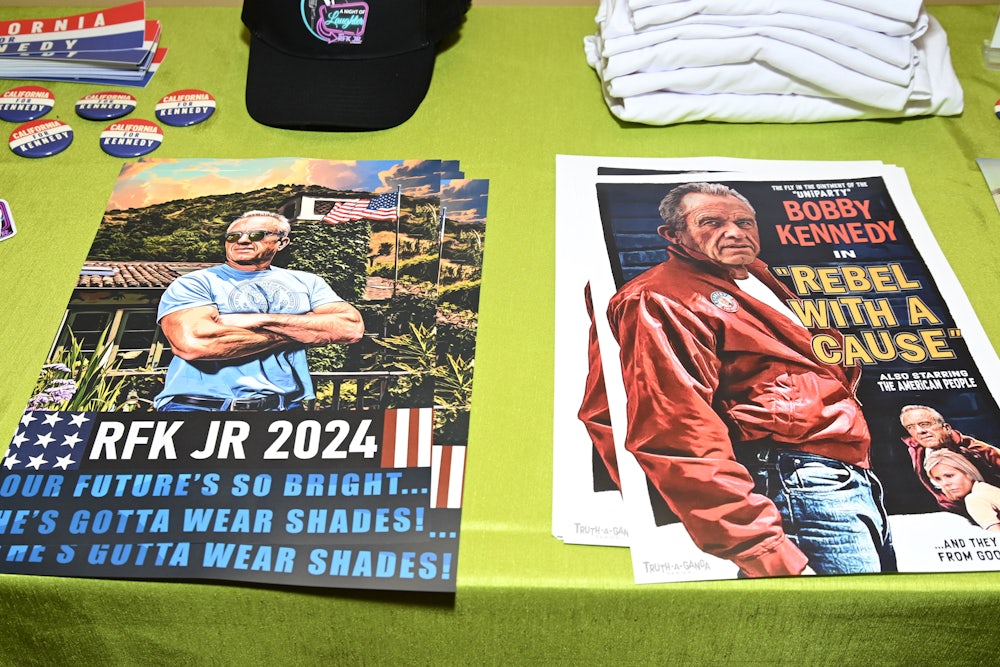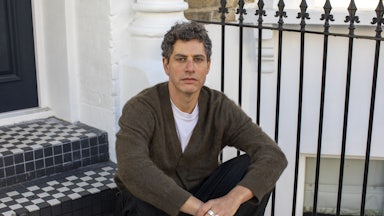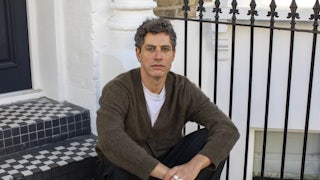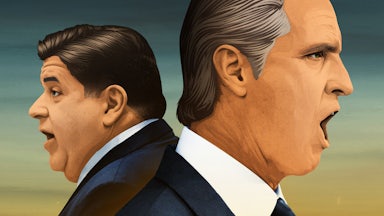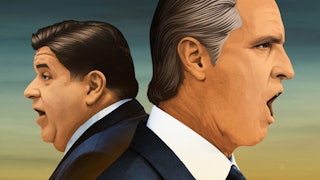When Robert F. Kennedy Jr. walked past us, orbited by a force field of security and advisers on a Wednesday evening in Los Angeles, no one really noticed. Instead, the crowd inside the Million Dollar Theatre had its attention locked on the stage, where the long-shot presidential candidate was giving a pretaped speech.
“I’ve come here today to declare our independence from the tyranny of corruption, which robs us of affordable lives, our belief in the future, and our respect for each other,” droned a video playing Kennedy’s October 2023 speech announcing he would be running for president as an independent. “But to do that, I must first declare my own independence—independence from the Democratic Party.”
The audience, here for a comedy fundraiser hosted by RFK’s wife, the Curb Your Enthusiasm actress Cheryl Hines, was rapturous. Wearing a TED Talk headset microphone, his gaze stern, RFK told us that we are, in a nutshell, fucked. And the only way to break free was to make him president.
It was a dark message: All of us are prisoners of a corrupt system—even the elites. “They, too, want liberation from the system that has captured them,” Kennedy said.
To the Democrats, he’s a uniquely destructive force: not just Ralph Nader in 2000 but a deranged vaccine conspiracist hoping to undo a century of medical advancement. To Republicans, he’s a UFO on the verge of abducting just enough anti-vaxxers to steal the presidency from Donald Trump. And to a certain type of person, he’s the truth.
Kennedy has drawn unexpectedly high poll numbers as an independent candidate for the general election. In some polls, RFK is the most popular candidate among young voters. One Quinnipiac University survey showed him getting 22 percent in a three-way general election against Joe Biden and Trump. Another revealed higher favorability ratings against Trump or Biden. At least one poll has shown RFK leads in support from those under 45. Here, in Los Angeles, he’s trying to make the case that he really is a serious presidential candidate—and that he can raise the money a serious presidential campaign needs.
RFK is not a funny person, but comedy was the theme of the fundraiser. That alone was strange, and presented a sort of cognitive dissonance for the evening. The jokes weren’t funny, but everything else was. The believers were out in full force, a band of political outcasts from the right and left. Kennedy was their new master. Even though this was L.A., the crowd wasn’t your classic set of Hollywood liberals. It appeared to draw mainly from neighboring Orange County, the historically conservative red bruise on sky-blue California. One attendee, Derrel Young, told me, “If you’re looking for the Hollywood crowd, this is not it.” Instead, the event conjured a mirage of Hollywood support, featuring has-been comedians such as Adam Carolla and Rob Schneider, who have taken to railing against cancel culture as their careers have nose-dived.
The event attracted classic environmentalists and people who loved the Kennedys no matter what they did, but it also brought out new age hippies with a lot of money; Joe Rogan hypebeasts; anti-establishment troublemakers; and free-speech, anti-vax obsessives—the candidate’s base, in other words. It was a young crowd as far as political events go. A member of one of the most storied political dynasties in history—privileged and damaged—was now one of theirs. He might be crazy, but he was their kind of crazy. If you are to believe the cosmos, as many people in L.A. do, Pluto has entered Aquarius for the first time since the American Revolution, igniting a time of great tumult. Conspiritualists have forecasted 2024 as a revolt. The figure bringing that to bear for them is Kennedy.
For all the talk of Kennedy as a presidential spoiler, there are a number of big, unanswered questions about his campaign. It’s not even clear how many state ballots his name will appear on. So far, he says he has enough signatures to appear on the ballot in Utah, Hawaii, New Hampshire, and Nevada, a crucial swing state that saw less than a 3 percent margin between Trump and Biden in 2020. Meanwhile, a super PAC supporting RFK Jr. says it has enough signatures to add his name in Arizona, Georgia, Michigan, and South Carolina.
A big part of his allure is pretty simple. According to a focus group of Detroit voters conducted by Breaking Points and J.L. Partners, people gravitate toward RFK Jr. for two reasons: He’s a Kennedy, and he’s got anti-establishment appeal. He’s also not Trump or Biden, which helps in an election where loads of people detest both candidates.
If you are to believe polling and pundits from both parties, Kennedy is a unique threat to the republic because he’s getting in the way of a Democratic Party re-coronation or Trump’s second coming. Much of Kennedy’s fundraising and polling support come from people who have supported Trump, such as classic Reagan Republican and financial tycoon Timothy Mellon, who gave RFK Jr. $15.5 million last year.
The weirdness of Kennedy’s base—Reagan Republicans and environmentalists holding hands with anti-vaxxers—makes it difficult to assess precisely what type of spoiler he is. With RFK on the ballot, a March Harvard CAPS-Harris poll found, Trump’s lead increases over Biden by 1 point. Trump scored 44 percent to Biden’s 37 percent, while Kennedy raked in 18 percent. Still, it’s also plausible that RFK Jr. could end up tossing the election to his former party, becoming a sort of Nader in reverse.
RFK Jr.’s big money funding comes from a smattering of tech evangelists, former Democrats—including tech attorney Nicole Shanahan, whom he named as his running mate on March 26, and who has been a major donor to his campaign—and entertainers, most well past their prime. Gavin de Becker, whose firm provides security for high-profile people, including the candidate himself, is the second-biggest donor to the RFK Jr. super PAC, American Values. Other backers include David Marcus, the former president of PayPal, and former Democratic financier-turned-Trump supporter Omeed Malik. RFK has also received support from some celebrities, such as Alicia Silverstone, Eric Clapton, and Oliver Stone. None of them got back to me to talk about their support.
A clearer picture of RFK’s base emerged at his L.A. fundraiser. For $1,500, the event promised “seating in the first few rows,” “a cool vibe and scrumptious bites,” and a chance to rub shoulders with RFK, Hines, and the comics. In case the Kennedy campaign denied my request for press access, I signed up my family for a raffle to attend. We all won tickets.
People came from faraway places. Standing in line, dressed in full Navy regalia, 72-year-old Lt. Cmdr. Leonard Le Blanc III told me he had traveled 8,000 miles from Bangkok in hopes of meeting RFK. “Given Mr. Kennedy’s interest in the deep state,” Le Blanc said, “I’d want to give him a copy of my book.” It was about the military-industrial complex and the invasion of Iraq, a topic I’d hear a lot about over the course of the night.
Further down the line, a nice couple originally from Orange County told me they liked RFK because he spoke his mind.
“He’s not afraid to tackle some really sensitive issues,” Lisa Huett told me. She ranked the environment and vaccines equally as the two issues most important to her. Both she and her husband opted out of the Covid vaccine. “I just wanted more studies around it,” she told me. “But we’ve had all of our childhood vaccines,” her husband, Jason, added, as if to soften bad news.
They previously voted for Obama, then Trump during the last two elections. “But I’m not beholden to Trump,” Jason clarified, citing the limit on tax deductions Trump enacted via the SALT cap.
Derrel Young, the L.A. resident whom I met earlier, came over to me with a friend named Jason. They both said they were here for the comedy.
“I’m just here to see somebody say something funny, and after that my ears are open,” Young said.
“What do you think of this crowd?” I asked.
“There’s a lot of white people here tonight,” said Young, who is Black, smiling.
I walked into the theater and toward the front row, which theoretically was reserved for people who paid $1,500. There were a lot of empty seats, so I sat down.
“Our son’s a heterosexual. We’re dealing with it,” joked comedian Mike Binder. People laughed. I turned to get a look at them. They were having a great time.
Explaining why Cheryl Hines’s TV husband wasn’t in attendance, the comedian said, “We didn’t want to spend the money to surgically remove Larry David from Barack Obama’s ass.”
And that was basically his whole bit. Most of the comedians that evening leaned into the culture wars, lobbing jokes toward the queer community, people of color, and the unhoused. Few, if any, were directed at Trump or the right. The main event was former Saturday Night Live cast member-turned-fedora guy Rob Schneider, who said conservatives have been afraid to speak up in Hollywood about cancel culture and vaccines. “I try and explain California to people,” he said, prowling the stage. “You know, one day you drop off a boy at school and at the end of the day you pick up a girl.” More laughs.
“They wanna pay slave reparations to people who were never slaves, to be paid for by people who never owned slaves, in a state that never had slaves. That’s like paying child support for a child you never had to a woman you never fucked.” I left to go to the bathroom. On my way back, I purchased a beer and checked my email. Kennedy was begging me for money. It sounded urgent. On Instagram he was going skydiving.
That evening, I’d heard about a range of issues that drew people to Kennedy: the deep state war machine, vaccines and free speech, the environment, and so on. There wasn’t one thing that brought people out. It didn’t seem like a left or right thing, a democracy versus fascism thing, or a class or identity thing. For these people, the common thread was us versus them, insiders versus outsiders. Populism is dead, and this is what’s left: a populist who isn’t really talking about the working class. A guy leveraging his famous name to try to convince lost people he can lead them out of the darkness.
Then RFK Jr. walked by and back to his seat. A woman burst out of the theater after he passed, crying. I asked her if she was OK and what was wrong.
“I am just honored to be near him,” said the woman, leaking tears. Her name was Susan Dinsmore. “I’m such a liberal, MLK, anti-war person. I’m so tired of war and money going towards wars,” she went on. Democrats and Republicans were no different when it came to funding war. “America could be such a great country, and we’re not. To me, this is our last hope.”
A San Fernando Valley native who worked for Whole Foods for 20 years, Dinsmore appeared to be one of those classic Kennedy liberals—an anti-war, pro–civil rights environmentalist—who was not turned off by RFK Jr.’s flirtations with the right. Instead, she saw him as a true liberal. It was the Democratic Party that had changed.
“I just think of his uncle and everything that happened was terrible. We had hope then.” The tears returned.
Then she smiled.
“And he’s so handsome.”
